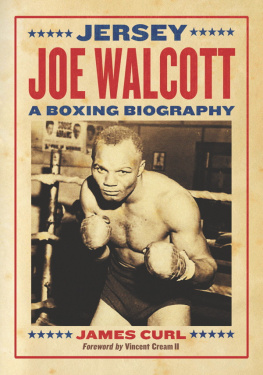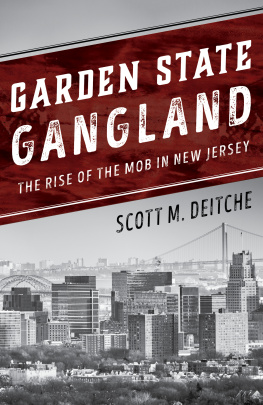Library of Congress Cataloging-in-Publication Data
Names: Hodges, Graham Russell, 1946 author.
Title: Black New Jersey : 1664 to the present day / Graham Hodges.
Description: New Brunswick : Rutgers University Press, 2018. | Includes bibliographical references and index.
Identifiers: LCCN 2017060310| ISBN 9780813595184 (cloth : alk. paper) | ISBN 9780813595177 (pbk. : alk. paper)
Subjects: LCSH: African AmericansNew JerseyHistory. | New JerseyRace relationsHistory.
Classification: LCC E185.93.N54 H64 2018 | DDC 305.896/0730749dc23
LC record available at https://lccn.loc.gov/2017060310
A British Cataloging-in-Publication record for this book is available from the British Library.
Copyright 2019 by Graham Russell Gao Hodges
All rights reserved.
No part of this book may be reproduced or utilized in any form or by any means, electronic or mechanical, or by any information storage and retrieval system, without written permission from the publisher. Please contact Rutgers University Press, 106 Somerset Street, New Brunswick, NJ 08901. The only exception to this prohibition is fair use as defined by U.S. copyright law.

The paper used in this publication meets the requirements of the American National Standard for Information SciencesPermanence of Paper for Printed Library Materials, ANSI Z39.48-1992.
www.rutgersuniversitypress.org
Manufactured in the United States of America
Dedicated to the memory and achievements of black New Jersey historians
Marion Thompson Wright (19051962)
Giles R. Wright Jr. (19352009)
Clement Alexander Price (19452014)
Lawrence Greene (1946)
Black N ew J ersey covers the complex history of people of African descent in New Jersey, a state that today is among the most diverse, urbanized, and densely populated in the Union. New Jersey is also now one of the five most racially segregated states in America. Accordingly, Black New Jersey says much about African American aspirations for freedom and equality and about our nations legacies of slavery and racism. A slave society from its inception, New Jersey was the last state in the north to initiate gradual emancipation in 1804. Its racial politics have been historically very conservative. Some of its white residents were the most intransigent defenders of slavery and segregation; others were among the sharpest critics. Today, New Jersey is home to some of the most talented and wealthiest African Americans in the United States and boasts a strong, resilient black middle class. Yet many of its black citizens are mired in poverty and burdened by legal problems exacerbated by poor health, housing, and education. Those paradoxes of slavery and freedom run throughout this book. Race may be the predominant means used to interpret New Jersey black society, but increasingly class is also important.
Blacks have been important in New Jerseys population since its origins in the 1660s. People of African descent constituted 40 percent of Bergen Countys population in the colonial period. Today New Jersey is the eleventh most populous state in the Union. African Americans make up the third largest group in the state behind whites and Hispanics. The 2010 U.S. census enumerated 8,791,894 people in New Jersey of which 13.7 percent or about 1.205 million were of African descent, giving the state the fifth largest black population in the nation. New Jerseys location between two major American metropolises make African Americans in the state part of an even more impressive total. Combined with the populations of the Standard Metropolitan Statistical Areas of New York and Philadelphia, two cities with enormous historical and contemporary impact on New Jersey, there are now nearly 30 million people or slightly less than 10 percent of the total population of the United States. People of African descent account for over 4.5 million of this populace, about 10 percent of the national total, all within a straight line distance of less than one hundred miles. Newark is at the exact center of the 600-mile urban area that stretches from Maine to Virginia.
Those numbers are one indication of what Black New Jersey can tell us about our nations history, present, and future. If, as one book has put it, we can search for the meaning of America on the New Jersey Turnpike, the presence in the state of African Americans and their interactions with whites and other ethnicities allow us to grapple with national questions on a state and regional scale. As Marion Thompson Wright, one the states greatest historians put it, New Jersey as a state has always reflected the experiences of a nation. Being a pivotal state, New Jersey has had the unique advantage of serving as a proving ground for battles involving opposing ideologies in human relations.
The author and journalist Isabel Wilkerson recently demanded that the North accept its legacy of slavery and racism; New Jersey is a good place to begin that understanding. The themes I address in Black New Jersey are not unique to the state and are highly representative of national issues. Among the topics addressed in this book are slavery and its lineages; freedom and racism; black community and acculturation with other ethnicities and nationalities; gender and class; rural, urban, and suburban developments; agrarian, industrial, and service economies; religion; popular culture; and politics.
This book examines African American accomplishments and setbacks from the origins of New Jersey to the present day. Each chapter includes demographic information about black people in New Jersey. As New Jersey law has heavily impacted the history of its black population, the book indicates how state laws affected people of color and how they responded through resistance and accommodation. A second important impact was religion, which made the deepest penetration into the souls of black New Jerseyans. Accordingly, I explain how European and African religions affected people of color during each era. I connect the religious experience with education, and in the second half of the book education intersects with law and politics. New Jerseys black people have contributed mightily to state and national cultures and I trace the creation and development of African American culture. Finally, I use biographical materials about important and lesser-known black New Jerseyans to illustrate these themes.
This study has benefited immensely from several fine general chroniclers of black New Jerseys past. Marion Thompson Wright, one of the nations first female African American scholars, published a highly influential and unsurpassed study of black education in New Jersey in 1941. She also authored a series of influential articles that laid out many of the themes and evidence used by later historians. I credit her work at moments where she clearly originated the scholarship. Clement Alexander Prices documentary history, and short histories by Giles Wright and Larry Greene have provided sturdy scaffolding for my efforts. Prices collection of documents ranges from the colonial period to the 1980s while Wrights and Greenes concise histories offer excellent demographic and sharp historical commentary about New Jerseys African Americans. My intention is to respect and build on these studies to broaden and deepen our understanding of New Jerseys black past. I have used numerous scholarly works about the Mid-Atlantic and other parts of the United States to inform my arguments about New Jersey.











 The paper used in this publication meets the requirements of the American National Standard for Information SciencesPermanence of Paper for Printed Library Materials, ANSI Z39.48-1992.
The paper used in this publication meets the requirements of the American National Standard for Information SciencesPermanence of Paper for Printed Library Materials, ANSI Z39.48-1992.